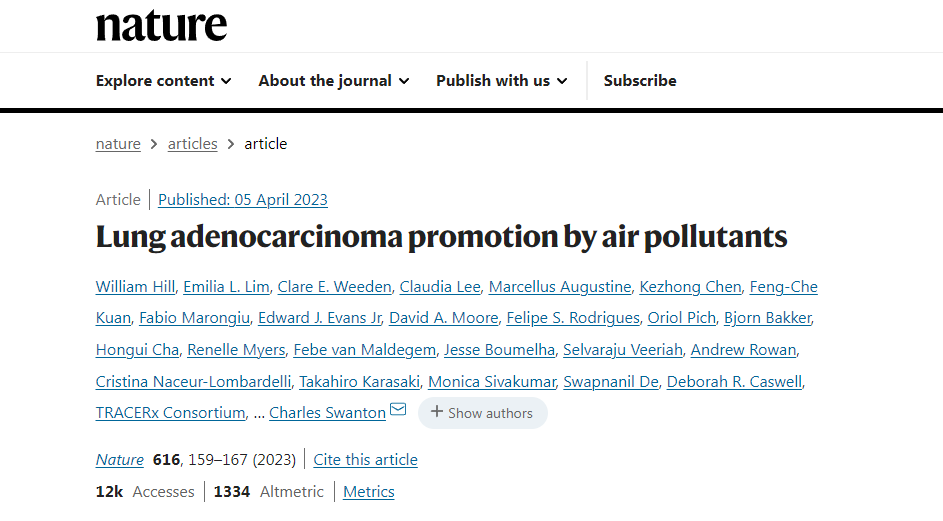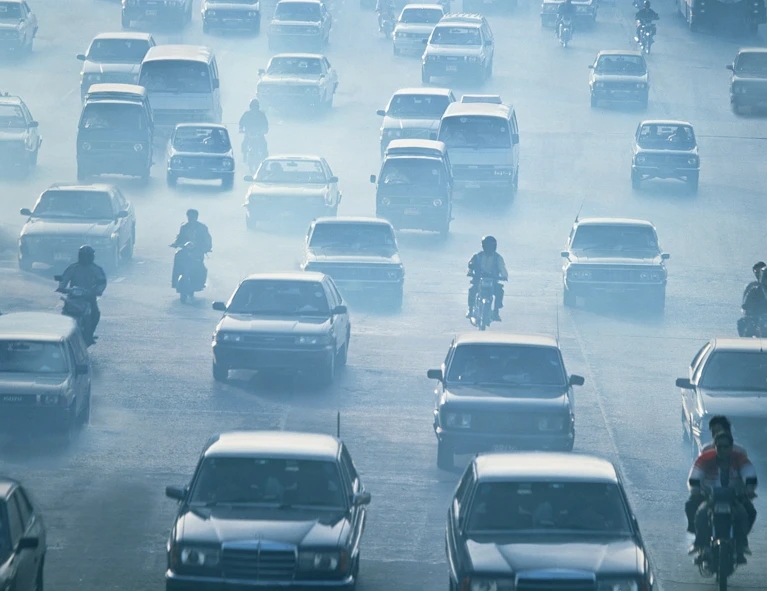A comprehensive study of human health data and mouse experiments shows that air pollution may cause cancer not through DNA mutations but by creating an inflammatory environment that "encourages" the proliferation of cells carrying cancer-causing mutations.
The study, published April 5 in Nature, sheds light on the mechanisms by which environmental exposures trigger cancer and looks to find ways to prevent it.

"The idea is that exposure to carcinogens may cause cancer, but it doesn't actually have any effect on DNA." said Serena Nik-Zainal, a medical geneticist at the University of Cambridge in England. "Not every carcinogen is a 'mutagen,'"

Air pollution kills millions of people worldwide each year, with more than 250,000 of them dying from a type of lung cancer called adenocarcinoma. However, Nik-Zainal said studying how air pollution triggers cancer has been difficult, in part because the effects of air pollution are not as pronounced as other carcinogens, such as tobacco smoke or ultraviolet light.
To uncover the mechanism, Charles Swanton of the Francis Crick Institute in the United Kingdom and colleagues collected environmental and epidemiological data from the United Kingdom, Canada, South Korea and Taiwan, China.
First, to reduce the impact of tobacco smoke on the data, the team focused on lung cancers carrying mutations in the EGFR gene. These mutations were more prevalent in people who never smoked than in smokers.
It turned out that lung cancers carrying EGFR mutations were associated with exposure to air pollution in the form of PM2.5 or smaller respirable particulate matter. This pollutant is emitted by internal combustion engines, coal-fired power stations and burning wood.
Later, to learn more, the researchers designed experimental mice carrying an EGFR mutation associated with human cancer. Mice exposed to particulate matter similar to that found in air pollution were more likely to develop lung cancer than control mice that were not exposed to particulate matter.
However, despite the higher incidence of lung cancer, there was no increase in the number of mutations in the lung cells of the mice. Instead, they showed signs of an inflammatory response that lasted for several weeks after exposure to particulate matter. Some of the immune cells that flocked to the lungs expressed a pro-inflammatory protein called IL-1β. Treating mice with an antibody that blocks IL-1β reduced their lung cancer incidence.
Taken together, the findings suggest that air pollution promotes the proliferation of mutant cells already present in the lungs, which may be the result of the accumulation of DNA errors during aging.
Lung adenocarcinoma promotion by air pollutants
Journal: Nature
Abstract: A complete understanding of how exposure to environmental substances promotes cancer formation is lacking. More than 70 years ago, tumorigenesis was proposed to occur in a two-step process: an initiating step that induces mutations in healthy cells, followed by a promoter step that triggers cancer development1. Here we propose that environmental particulate matter measuring ≤2.5 μm (PM2.5), known to be associated with lung cancer risk, promotes lung cancer by acting on cells that harbour pre-existing oncogenic mutations in healthy lung tissue. Focusing on EGFR-driven lung cancer, which is more common in never-smokers or light smokers, we found a significant association between PM2.5 levels and the incidence of lung cancer for 32,957 EGFR-driven lung cancer cases in four within-country cohorts. Functional mouse models revealed that air pollutants cause an influx of macrophages into the lung and release of interleukin-1β. This process results in a progenitor-like cell state within EGFR mutant lung alveolar type II epithelial cells that fuels tumorigenesis. Ultradeep mutational profiling of histologically normal lung tissue from 295 individuals across 3 clinical cohorts revealed oncogenic EGFR and KRAS driver mutations in 18% and 53% of healthy tissue samples, respectively. These findings collectively support a tumour-promoting role for PM2.5 air pollutants and provide impetus for public health policy initiatives to address air pollution to reduce disease burden.





